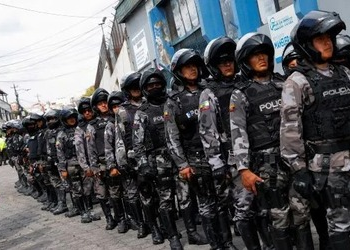Ecuador’s gangs have unleashed an explosion of violence in response to the new administration’s efforts to rein in criminality, but the government’s rapid militarization of the conflict lacks an exit strategy.
President Daniel Noboa declared a state of internal armed conflict on January 9 as gangs rioted in prisons, attacked security forces, and invaded a live TV news broadcast.
The president named 22 criminal groups as “terrorist organizations” and ordered the country’s armed forces and police to mobilize and “neutralize” these groups.
SEE ALSO: GameChangers 2023: Ecuador Loses Its Grip on Crime
The wave of apparently coordinated gang violence against civilians and security forces followed an earlier security crackdown by the president in response to the disappearance of an imprisoned, high-profile gang leader.
Adolfo Macías, alias “Fito,” the founder and convicted leader of the Choneros gang, vanished from his prison cell in the port city of Guayaquil on January 7 before he was set to be transferred to a maximum security facility.
Noboa’s government confirmed Fito’s escape on January 8, when the president declared a state of emergency, deploying thousands of soldiers in a man-hunt to capture the Choneros leader and announcing a 60-day mobilization of soldiers in Ecuador’s streets and prisons.
The rapid escalation of the conflict between the government and gangs represents the first major security crisis for Noboa, who took office in November 2023.
Ecuador’s leaders have declared states of emergency before, especially in recent years as the country’s gangs grew stronger through drug trafficking, took control of prisons, corrupted the country’s institutions, and began expanding into new criminal economies. But Noboa’s declaration of an armed conflict with gangs is the first in the country’s history.
InSight Crime Analysis
Noboa has doubled down on a militarized approach but has given no indication of a long-term plan.
“Everything is a crisis that needs an immediate solution, not taking into account that the problems of violence and criminality cannot be solved immediately,” Max Campos, a security analyst who formerly served as Ecuador’s deputy interior minister, told InSight Crime.
SEE ALSO: From Rhetoric to Reality on Ecuador’s Security Challenge
On the campaign trail, Noboa initially promised to fight organized crime by strengthening the social safety net and investing in education. But after the assassination of another candidate, Noboa’s rhetoric took a turn towards militarization, promising more authority for armed forces, new technology, and weapons for police.
However, tough-on-crime policies seem to have fueled backlash from the gangs rather than quelling them. Noboa’s administration has acknowledged that one of his flagship policy proposals — to build new high-security prisons and transfer jailed gang leaders there — may have set off this most recent wave of violence.
Now that Noboa has declared war, his escalation strategy has reached its peak, with no clear plan if this war drags on.

